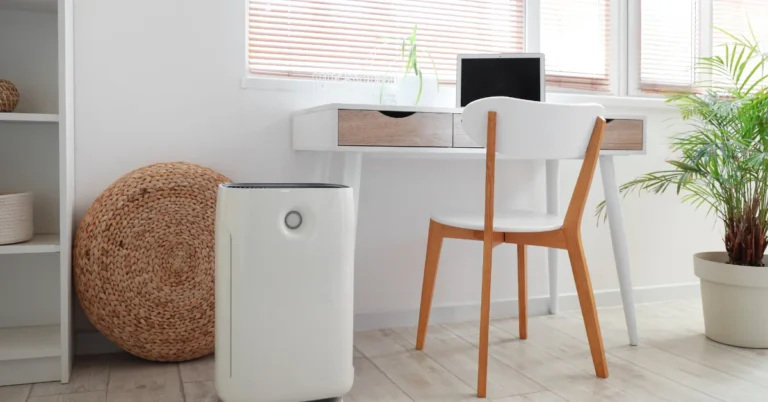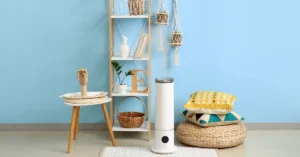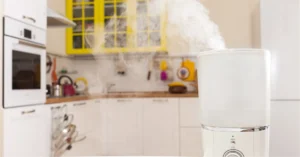Ever been startled awake in the middle of the night by a smoke alarm, only to find out it wasn’t a fire but your trusty humidifier? You’re not alone. Humidifiers are a staple in many homes, especially during dry seasons, but they can sometimes trigger unexpected issues with smoke detectors. How can something designed to improve air quality cause such an inconvenience?
In this post, we’ll dive into whether humidifiers can set off smoke detectors, the types of alarms most affected, and practical ways to prevent false alarms. We’ll also explore related concerns, like potential damage to electronics, FSA eligibility, and using a humidifier with medical devices like CPAP machines.
How Smoke Detectors Work
To understand why your humidifier might set off a smoke detector, let’s first look at how these devices work. There are two main types of smoke detectors: ionization detectors and photoelectric detectors.
- Ionization Smoke Detectors: These are designed to detect fast-burning, flaming fires. They use a small amount of radioactive material that ionizes the air inside a chamber. When smoke particles enter the chamber, they disrupt the flow of ions, triggering the alarm. While these detectors are very sensitive to small smoke particles, they can also react to non-smoke particles like dust or even the fine mist from a humidifier.
- Photoelectric Smoke Detectors: These are better at detecting slow, smoldering fires. They work by using a light beam that, when interrupted by smoke, causes the alarm to go off. Humidifiers, especially if placed too close to these detectors, can send out vapor dense enough to disrupt the beam, setting off a false alarm.
Each type has its own advantages, but both can be susceptible to triggers unrelated to fire—like the water vapor released by humidifiers. Understanding this will help you choose the right smoke detector and use your humidifier safely.
Can a Humidifier Set Off a Smoke Detector?
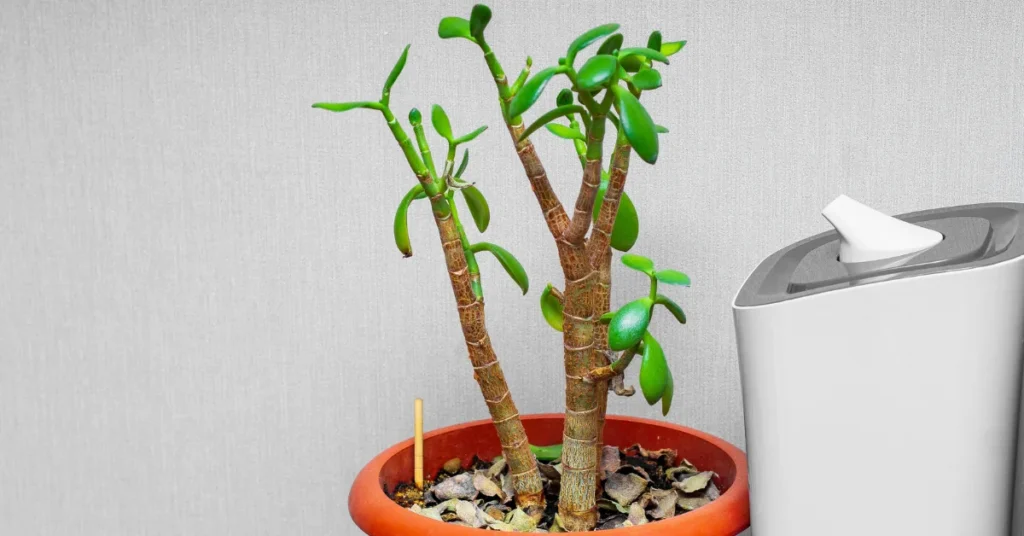
Yes, a humidifier can set off a smoke detector, though it’s not a common occurrence in every situation. It largely depends on the type of smoke detector you have, the size of the room, and how close the humidifier is placed to the detector.
Humidifiers release a fine mist into the air to add moisture, which can sometimes mimic the smoke particles that smoke detectors are designed to sense. Ionization detectors are particularly sensitive to small particles, and if the vapor from the humidifier is dense enough, it could disrupt the ion flow, leading to a false alarm. Similarly, photoelectric detectors may mistake the vapor as an obstruction to their light beam, setting off an alarm.
Factors that Increase the Likelihood of False Alarms
- Proximity: Placing a humidifier too close to the smoke detector increases the chances of false alarms. If the vapor rises directly into the sensor, it can trigger a response similar to smoke.
- Room Size: In smaller rooms, the mist from a humidifier can concentrate more quickly, making it more likely to affect a nearby smoke detector. Larger rooms generally allow for better dispersion of vapor.
- Humidity Levels: If your humidifier is set too high, the air can become overly saturated with moisture, which could confuse the smoke detector.
Luckily, this issue is avoidable with the right setup and a little planning.
Can a Humidifier Set Off a Fire Alarm?
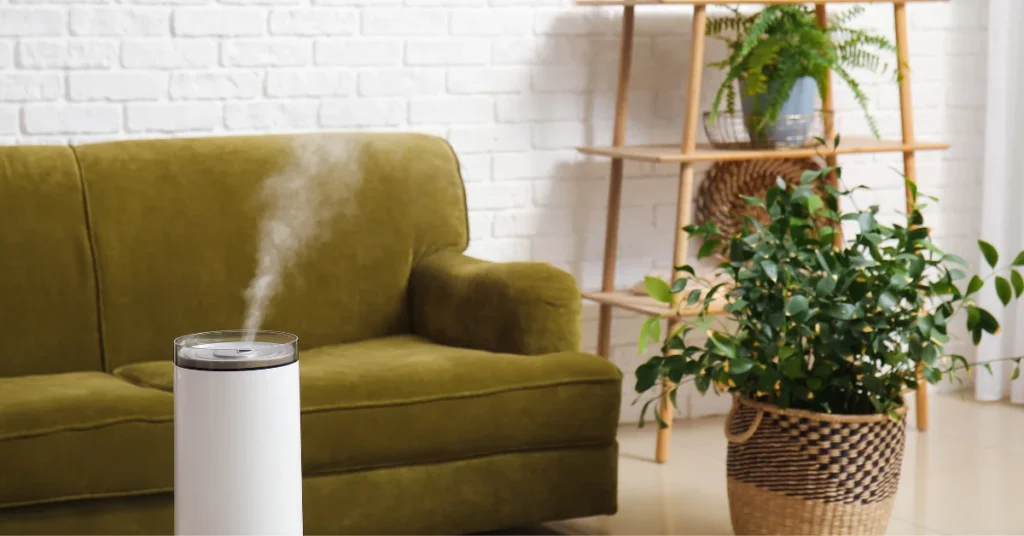
A humidifier can indeed set off a fire alarm, but it’s far less likely compared to smoke detectors. The distinction between smoke detectors and fire alarms lies in their design and sensitivity. While smoke detectors are primarily focused on sensing smoke or particles, fire alarms are often part of more complex systems that may include multiple triggers, such as heat sensors and carbon monoxide detectors.
Fire alarms that include smoke detection sensors might still be susceptible to false alarms from the fine mist of a humidifier, especially if the room becomes too humid or the vapor is directed near the sensor. However, fire alarms with heat or flame sensors are much less likely to be affected by humidity since they rely on temperature changes or actual flames to trigger the alarm.
Fire Alarms in Larger Systems
If your home or building has a more advanced fire alarm system (commonly found in commercial settings or larger homes), it may be less prone to false alarms from a humidifier. These systems usually combine several types of detectors, which means it takes more than just vapor to set them off.
To prevent triggering a fire alarm, follow similar precautions as with smoke detectors: keep your humidifier at a reasonable distance from the alarm and avoid over-humidifying the space.
How to Prevent False Alarms from Humidifiers
No one wants to deal with the hassle of a false alarm, especially in the middle of the night. Thankfully, there are several steps you can take to ensure that your humidifier works safely without triggering your smoke detector or fire alarm.
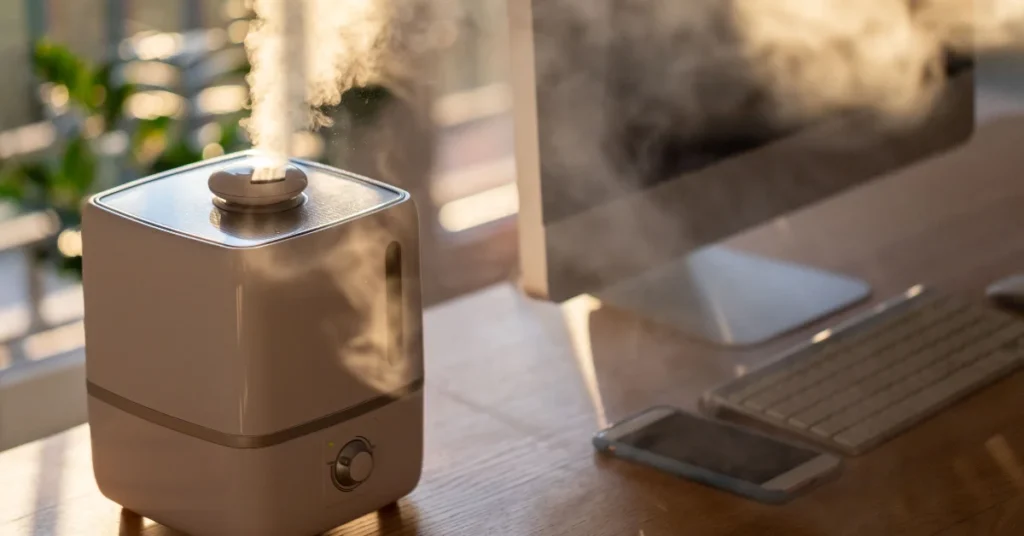
1. Place Your Humidifier Strategically
Avoid placing your humidifier too close to smoke detectors or fire alarms. Try to position it at least 10 feet away, especially if you’re using it in smaller rooms where the vapor might concentrate more quickly. Also, ensure the mist isn’t directly rising toward the detector—this can drastically reduce the chance of a false alarm.
2. Maintain Proper Humidity Levels
Over-humidifying a room can lead to moisture buildup, which increases the chances of triggering alarms. Keep your room’s humidity levels between 30% and 50%, which is both healthy for breathing and unlikely to affect detectors.
3. Use a Lower Mist Setting
If your humidifier has adjustable settings, opt for a lower mist output. A fine, gentle mist disperses more evenly throughout the room and is less likely to set off alarms than a heavy, concentrated vapor.
4. Ventilate the Room
Proper ventilation can help balance moisture levels. If the room is small, consider cracking a window or door to prevent excessive buildup of mist in the air. This way, the vapor won’t collect near the detector.
5. Regular Maintenance
Keeping both your humidifier and smoke detectors clean and properly maintained is essential. Accumulated dust or particles can make smoke detectors more sensitive, while unclean humidifiers may release debris along with the mist.
By following these simple tips, you can enjoy the benefits of your humidifier without worrying about setting off alarms.
Does a Humidifier Damage Electronics?
One of the concerns people have about using a humidifier, especially in rooms with lots of gadgets, is whether the extra moisture in the air could damage electronics. While humidifiers are designed to improve air quality, they can pose a risk to nearby electronics if used improperly.
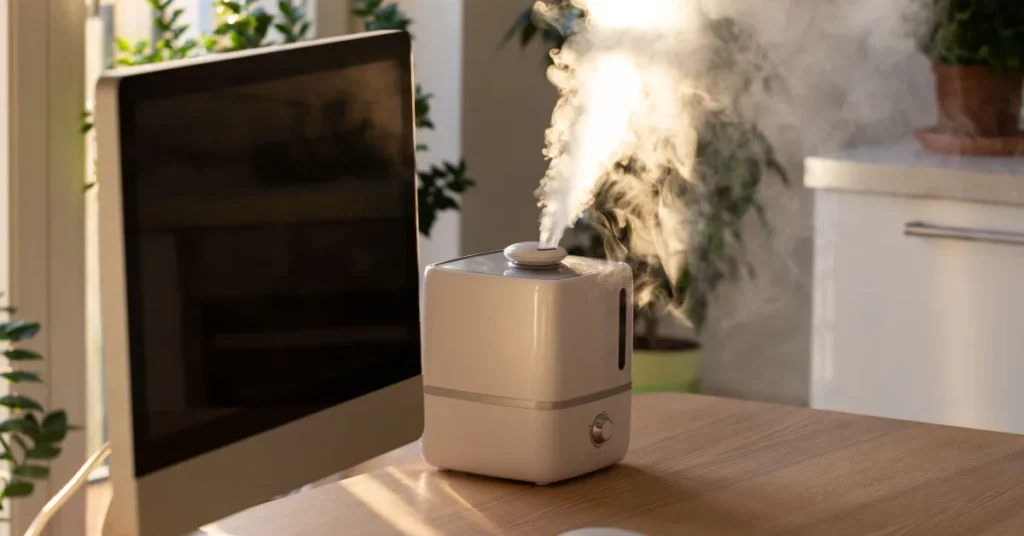
How Humidifiers Can Affect Electronics
Humidifiers release water vapor into the air, and if they are used in excess or placed too close to electronics, moisture can start to condense on surfaces. Over time, this moisture can lead to:
- Corrosion of metal components: Prolonged exposure to high humidity can corrode the metal parts inside your electronics, affecting their functionality.
- Short circuits: In rare cases, excessive moisture can create short circuits in devices, potentially causing permanent damage.
- Dust and particle buildup: A humidifier can also make dust in the air stick to electronic components, leading to blockages or reduced performance over time.
How to Use a Humidifier Safely Around Electronics
To avoid damaging your electronics, here are some tips:
- Maintain Safe Distance: Keep your humidifier at least a few feet away from electronic devices like laptops, TVs, or gaming consoles. This will reduce the chance of direct mist contact.
- Monitor Humidity Levels: Keep humidity levels between 30% and 50%—this range is ideal for both human health and electronic safety. Using a hygrometer to check the humidity in your room can be helpful.
- Use Cool Mist Humidifiers: Cool mist humidifiers are generally safer for electronics compared to warm mist models, as they release vapor rather than steam, which is less likely to condense on surfaces.
By taking these precautions, you can safely enjoy the benefits of a humidifier without worrying about your electronics.
Is a Humidifier FSA Eligible?
If you’re looking to purchase a humidifier, you might wonder if you can use your Flexible Spending Account (FSA) to cover the cost. An FSA allows you to set aside pre-tax dollars for qualifying medical expenses, making it an appealing option for certain healthcare products. But does a humidifier count?
Can You Use Your FSA to Buy a Humidifier?
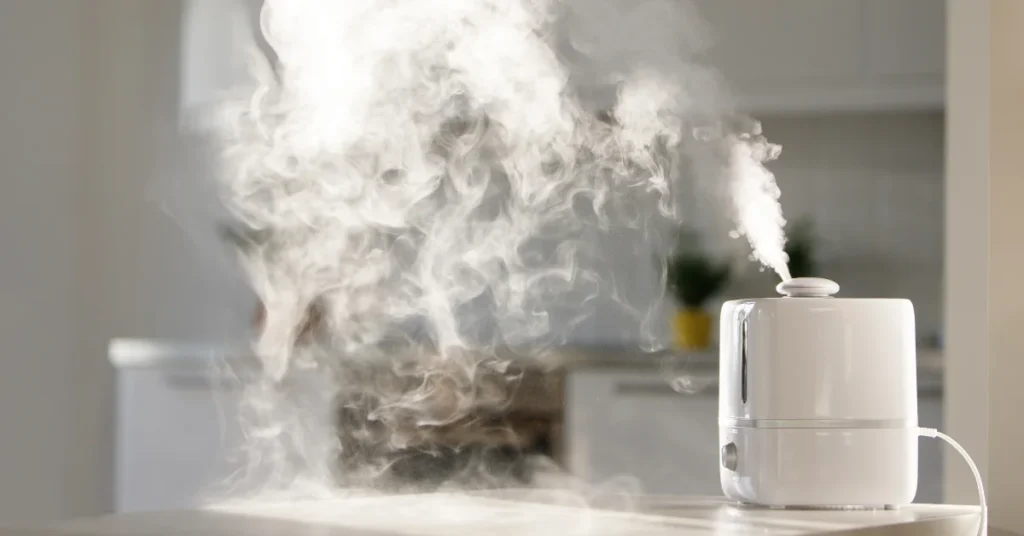
The answer is yes—but with a caveat. A humidifier can be FSA eligible if it’s considered a medical necessity for treating a specific health condition, like allergies, asthma, or other respiratory issues. To qualify, you’ll likely need a doctor’s prescription or a letter of medical necessity. The IRS states that only expenses primarily used to alleviate or treat a medical condition are eligible for FSA reimbursement, so you’ll need to prove that the humidifier is a required part of your treatment.
How to Check If Your Purchase Qualifies
- Consult Your Doctor: If you suffer from conditions like chronic allergies, sinus infections, or asthma, speak to your healthcare provider about whether a humidifier could be part of your treatment plan.
- Get Documentation: Ask your doctor to provide a letter of medical necessity or a prescription. This document will need to state that the humidifier is recommended for your health condition.
- Submit for Reimbursement: Once you have the documentation, you can purchase the humidifier and submit the receipt, along with the letter or prescription, to your FSA provider for reimbursement.
Items to Keep in Mind
- Not all humidifiers may qualify, so check with your FSA provider about the specific product you intend to buy.
- If you purchase a humidifier without a prescription or medical reason, it won’t be eligible for reimbursement through your FSA.
By ensuring you have the proper paperwork, you can potentially save money on your purchase while managing your health more effectively.
Can You Use a Humidifier with a CPAP Machine?
If you use a CPAP machine (Continuous Positive Airway Pressure) for sleep apnea or other breathing disorders, you might be wondering whether you can use a room humidifier alongside it. The answer is yes, but there are a few things to consider to ensure you’re using both devices effectively and safely.
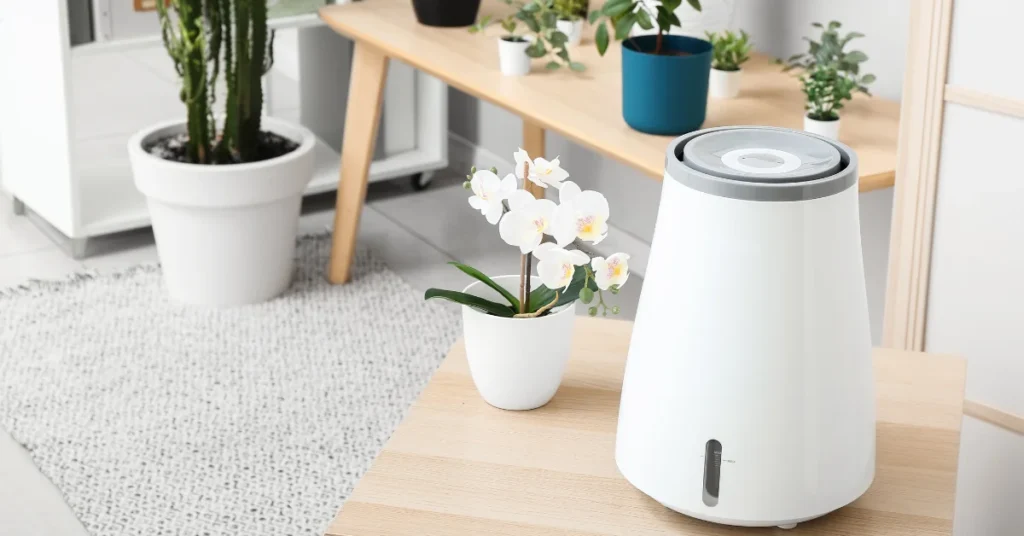
Using a Room Humidifier with a CPAP Machine
CPAP machines often come with built-in humidifiers that deliver moisture directly through the mask, helping to reduce dryness in the throat and nasal passages. But what if you want to use a separate room humidifier in conjunction with your CPAP machine?
While it’s perfectly safe to use both devices at the same time, the key is balance. Here’s how you can use them together:
- Place the Room Humidifier at a Safe Distance: Avoid placing the room humidifier too close to your CPAP machine to prevent excess moisture from interfering with the electronics or the airflow.
- Monitor Humidity Levels: If your CPAP machine already has a humidifier, using a room humidifier in a small, enclosed space might create too much moisture, leading to discomfort or condensation in your CPAP tubing. Keep the room’s humidity at a moderate level to avoid this.
- Reduce Dry Air Symptoms: For people who find that their built-in CPAP humidifier doesn’t provide enough moisture, a room humidifier can help to keep the air in the room from feeling too dry, improving overall comfort.
Best Practices for Using a CPAP with a Room Humidifier
- Regular Cleaning: Both your CPAP machine and the room humidifier require regular cleaning to avoid mold, bacteria, or mineral buildup, which could harm your respiratory health.
- Use Distilled Water: Always use distilled water in your CPAP humidifier to avoid any potential buildup in the machine.
- Check for Compatibility: If you’re using a machine like the ResMed AirSense 11, which already has advanced humidity settings, be mindful of how the additional moisture from the room humidifier may affect your experience.
By following these guidelines, you can use both devices effectively and enjoy better air quality and comfort throughout the night.
Conclusion
Humidifiers are a fantastic way to improve air quality, but when it comes to setting off smoke detectors or fire alarms, they can sometimes cause a bit of confusion. While it’s possible for a humidifier to trigger an alarm, following a few simple precautions—like placing the humidifier strategically and maintaining optimal humidity levels—can help you avoid any false alarms.
We’ve also covered some related concerns, such as whether humidifiers can damage electronics (hint: they can if used improperly), whether they’re eligible for FSA reimbursement, and how to use them safely with devices like CPAP machines. Armed with this knowledge, you can now enjoy the benefits of your humidifier without worrying about disruptions or damage.
So, before you set up your next humidifier, take a moment to check your smoke detector placement, monitor your humidity levels, and, if necessary, get a prescription to make it FSA-eligible. A little planning goes a long way in creating a healthier, more comfortable home environment.
